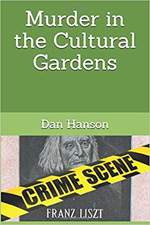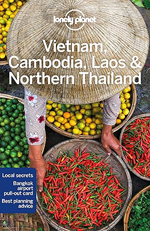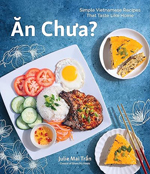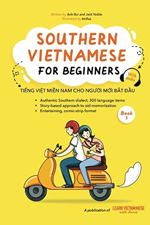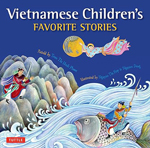This is a Tet Celebration morning. It is Tet Nguyen Danh, the huge festival season for Vietnamese all around the world. Families will travel from all lands in order to return home at Tet. In Viet Nam they enjoy the warmth and sunshine, while on this Cleveland morning, all is gray with wet mushy snow everywhere. But all still celebrate here with the fruit baskets, the special candies of stringy white coconut, tasty dried fruits, nut-flavored watermelon seeds that you must crack open with your teeth, delicious banh chong cakes packed in the center with all sorts of fillings, "li si" of gaily decorated red envelopes containing new money gifts for the children, and the thin branches of the small flowering yellow buds that especially mark the coming of the New Year.
Brother Doan comes by to drive us in his huge white minivan to the Knights of Columbus Hall on West 130th in Cleveland. All the Vietnamese families will come from all over Cuyahoga county and even from Akron and elsewhere to rejoice and recall the past. They also will apologize and settle old grievances while planning for a favorable, cheerful future. They will pray that this year, the Year of the Ram according to the 12 year cycle, will be a happy one for friends and foes.
The minivan turns left from Lorain onto West 130th and there is the building. In front is a huge archway with deep red rubber pillars, topped by a rectangular sign bearing the greeting, "Happy New Year." I naturally snap my photo of the huge arch and sign.
We then slosh our way along the concrete driveway and enter the large building. Everybody is busy, getting the hall ready for this evening. Some are setting tables while others pull out all the wires and loudspeaker equipment from stiff cardboard boxes. In one corner sits some gear for the lion dance which will be an essential part of the evening program that delights children of all ages.
I spot oblong colored signs taped to the walls, with slogans about ARVN, the Army of the Republic of Viet Nam. Yellow banners with red lettering proclaiming "Chuc Mung Nam Moi" also decorate the walls. The bright colors remind us of the South Vietnamese flag with its three bright red stripes on a gold field. (So few can explain the flag's meaning which symbolizes the three regions of Vietnam-north, central, and south-all united in one country.)
I sit down at a round table just off the kitchen area where the women are busy preparing the traditional foods of chay gio and pho soup along with the pork chunks topped by crunchy brown skin, sliced from the traditional roasted pig.
The village elder is there, sitting so straight, eyes alert, a slight smile beneath his moustache. He looks remarkably healthy at 94 years old. His hand clasps a large paper cup filled with iced Vietnamese coffee.
"You want one?" he asks me in English.
I nod yes. Somebody brings me a coffee and its tastes thick and sweet, just the prescription to wake me up and sharpen my senses.
Then others sit down at nearby tables and drink their coffees while greeting one another. The village elder's granddaughter brings him a cup of hot soup and noodles. "Do you want one?" She smiles at me. "Sure," I respond.
In less than a minute I am sticking my chop sticks into the hot salty broth and enjoying a clump of tasty noodles.
Jerry enters and sits at our table. He was an interpreter for six years of the war with the Special Forces Green Berets.
"How is your book coming along?" I quiz him. He once told me ten years ago that he was writing one. So I constantly bother him about it. He is very articulate and should have countless stories about the Green Berets and the relations between the Vietnamese and our soldiers. I fear so much that as we veterans die off one by one, all of these experiences will never reach our grandchildren. We become tiny printed cards with our photo on the front side atop the dates of our birth and death and a prayer on the back. We leave only stacks of these cards placed beside the transparent plastic donation box at the local funeral home, while our bodies lay stretched out comfortable (?) in the coffin.
Jerry and I talk about the war and the country of Viet Nam, now home for over ninety million people.
We speak about Tet Mau Than, the Tet Offensive by the Communists in 1968, exactly 46 years ago.
"Do you know why there was so much killing in Hue?" he quizzes me.
"No, why?" I ask.
"Someday I will tell all I know," he winks knowingly.
This really raises my curiosity. Hue had been the bloodiest of Tet battles marked by a huge massacre of Vietnamese civilians by the Communists.
Jerry continues now: "I went to school with one young man a long time ago, in the 1950's. One day he gave a speech. After he spoke then, I said to him 'You speak like the Communists.' "The man laughed at me but then later he was in Hue during that TET with the Communists. He was the one who sent so many to their deaths."
People in the US forget all that happened in that 1968 Tet Holiday season. They forget that 4,000 VN civilians were kidnapped by the Communists from that ancient Capital city. Their hands roped with wires behind their back, terror-stricken, pushed by their Communist captors, they stumble and fall as they move toward the sandy beaches near Hue.
There they are all killed by the Communists. They are too dangerous to keep alive. They are the elite, the leaders and government workers, and neighborhood spokespeople in Hue who do not want the Communists. So they are all condemned to die. (Yes, I know about My Lai when American soldiers killed almost six hundred Vietnamese youth, women, and men.)
"That man," says Jerry, now the prosecutor, "he was the one who did that."
"Is he still alive?" I ask.
"Yes, he is alive and in Hue." Jerry becomes silent.
Then we joke more about his book and why does he not write it. There is no satisfactory answer.
Finally he says, "I want Gia Hoa and you to visit me in Akron." Carefully he prints out his address in Akron and his telephone number.
Jerry has been president of the local Akron Vietnamese community but now he travels the world. "Now I journey where I want," he says.
"My last trip was to Japan. I also like to travel first class in the plane. It is expensive but I want that luxury," he defends his choices. "It cost me six thousand dollars but it is worth it. I like all the room to stretch out and there is all that service. The lady brings you anything you want." He waves his arm high and around to suggest everything.
"Why should I not spend all the money? It is mine. I am alone and my kids do not need the money. So I enjoy myself on the trips."
He then pulls out a huge thick folder with large envelopes in it. These enclose all photographs, outsized in beautiful colors from his travels. He shows me where in Japan he went, including the temples and buildings and the other spots.
He is in many of the photographs. He got somebody to snap photos of him.
I ask myself, "Is it a lonely life he enjoys, or suffers?" But he delights in his tour trips and that is a little enough reward for all he endured in the war.
He has a small red sports car and zips about everywhere. That is another of his passions and tiny enjoyments.
Then it is time for us to leave. The others in our car have places to shop. After that we all must get ready for this evening's grand celebration. We shall return home from the shopping late in the afternoon. It is time for us to hurry and get ready for the party and revelry
While the women including Phi and Gia Hoa are putting on their delicate silk ao dais of so many pretty soft colorful shades and decorated with birds and flowers, we get a call from the Community leaders at the West 130th Building. The Councilperson Matt Zone has arrived at the hall. The ladies were supposed to be there to greet him as he arrived. So now we are late.
We need to hasten so we can greet and welcome the City representative. The women seem to take forever to get ready while Brother Doan and I sit in his van in the ice-covered driveway and we joke about their delay. Eventually the women emerge from the house in their beautiful ao dai's and we are off
We arrive and the local community leaders escort us under the welcoming New Year arch and into the building, then over to where Councilperson Zone is standing. They have prepared a special table in front for us honored guests.
Zone will be the first speaker, bringing the official City's greetings and proclamation for Tet. The hall is filled, every table has all chairs occupied. So many Tet celebrants! The children race about in their games. The older people sit in happy conversation with their friends. How good it is, I am thinking, that so many in the community have shown up despite the nasty weather and cruelly cold temperatures. Remember many of these Vietnamese lived in Viet Nam where a cold day is one in the seventies.
On stage the Master of Ceremonies Teacher Toan, starts the program. They call out the names of various honored guests. Gia Hoa Ryan's name is called and they salute her for her many years of leadership. She is the longest resident of all Vietnamese here in the Cleveland area. She is probably one of the longest here in America, having arrived in 1971, four years before the great tidal wave of immigrants escaping the terror of Communism. They feared another bigger slaughter than happened during the Tet Offensive in 1968. Again I repeat, all of us know about the terrible murderous atrocities committed at My Lai by our own American soldiers, but most do not know about the Hue killings.
At our table, Ms. Ryan sits next to Councilperson Zone,. She is teaching him some Vietnamese words, including "Chuc Mung Nam Moi," that is "Happy New Year," and "Com On," that is "Thank you." Three of our young Vietnamese leaders and newest board members are there, Van who specializes in immigration law, Trang who has developed her thriving financial advice business, and Trinh who enjoys law licenses in both Ohio and Indiana. Mr. Le is there who is celebrating thirty years of excellent community leadership. My very well-informed morning companion Jerry sits next to me. It is good to welcome the leadership trio of Van, Trang, and Trinh who we know will work hard to continue the community's achievements.
The program formally opens with the Star Spangled Banner and next the Vietnamese National Anthem. Then a mournful Vietnamese music piece recalls all those who died in the war fighting for freedom and for their families who suffered so much. Next, the new priest for the local Catholic parish and three local Buddhist monks join the ceremony and offer their prayers.
The Councilperson is called to the stage and he bounds up the stairs in front with the energy of youth and grace. He is handed the microphone by MC Toan and he begins with "Chuc Mung Nam Moi." The audience goes wild, maybe that is an exaggeration, but they do clap and cheer to hear their language spoken by the official City representative. He presents the Proclamation and words of joy for this event.
Then they call me up to speak. So I totter across the floor and up the stairs. I do remember to advance to the stage center past the speaker's stand, to the altar remembering South Vietnam and all its soldiers and families. In tribute, I bow low three times and then hobble back to the microphone.
"Chao Anh Chi Em," I begin. ("Greetings to the gentleman, ladies, and youth here."
The audience claps as I continue on with my poor Vietnamese words.
"Chuc Mung Nam Moi," ("Happy New Year!")
"Hom ngay, chung ta tat ca vui ve." ("Today, we are all happy."
"Tai Sao chung ta vui ve? Why are we happy Because we are here with our wonderful families and friends, celebrating this joyous season of Tet.
"You came here to America forty years ago, compelled to leave your beloved native land because of the aggressor Communists. That was a time of challenge for all your people seeking a new life in America. This was a time of worry. You had left your homes for a new unknown land. Where were you going to resettle? What were you going to do? Where was your next meal?
"But look at what has happened in these forty years. Look at all your accomplishments. Look at how well your children and youth are doing in school. Look at the thriving neighborhoods you have built. Look at the prosperous businesses you are operating in our city.
"Some times people ask, 'Who won the Vietnam war?'
"I say, 'Look at all of you. See! Who won the war? You won the war.'
(I can hear my good friend Roger, a Green Beret soldier, coughing his disagreement behind me. But I know I am correct.)
"This year we celebrate the Year of the Ram "Day la nam cua con de.' (However, I say "day," with a hard "D' sound, but it is the soft "D" that is required. I should pronounce "de" as "yay." The moderator Teacher Toan and the audience all correct my wrong "d." Of course, their correction is actually a sign they my Vietnamese is getting better and worthy of being corrected.
I continue. "Consider what kind of animal is the 'con de,' or Ram. The Ram is a strong and reliable animal. It is resolute. It does not back off or surrender. It is ready to meet all challenges. Those are also the characteristics of our Vietnamese Community. You are tough and resilient. You are prepared for all tests and trials. So let us welcome our Year of the Ram, of 'Nam cua con de.'
"Again Chuc Mung Nam Moi. Happy New Year. Cam on nhieu lam!"
My speech is concluded and I am handed a shopping bag of gifts of Tet Wine and candy. Others will be called up for their holiday words. I return to the guest table now loaded down with holiday foods and drink. White rice, and pork chunks, chicken and roasted duck, crisp cha gio rolls, mixed green salad, and nuoc mam fish sauce, and of course one tall green bottled Heineken after another. For dessert there are the crunchy sesame balls filled with sweet fruit paste. Arriving in turn are the small shot glasses containing something slightly stronger than beer which you are urged to down all at once. "Mot cham phan cham!" or "Bottoms up." We feast and laughter delights us all.
I sit next to my friend Jerry most of the time. We listen to the Vietnamese community choir and the Karaoke singers. "I know all the songs they are singing and playing," he offers. "These songs come from the other side," he confides. He knows the pedigree of each one and tells me who wrote it. I listen carefully to each one and try to hear the Communist threat in the "bad" ones.
Later the DJ will play the dance music. Many will usher their partners to the dance floor. Twists and cha-cha-cha's, slow melodies, and even ballroom dancing will add to the festivities. I will, of course, dance the evening away with my nimble feet. Somebody is snapping photos and I stop to pose with my dance partner Gia Hoa. We smile for our photo and later we find ourselves on Facebook.
Now it is time for us elders to leave so that the young people can sing and party late. We rise and put on our coats to defend our bodies against the Cleveland freezing cold. There is a large donation box by the entrance and we will drop a check into it to pay our share for this holiday event. We take copies of the latest newspaper the Community is now publishing under its new leadership. We especially say farewell to the good young people who will carry on the community leadership after us. It has been a remarkable evening. The best part is the sense of hope in all the people, a belief that the community will continue, and our impression that they no longer need us ancient ones.
Back to Top
Back to Cleveland Vietnamese
More about Lt. Colonel Joseph Patrick Meissner
| 
